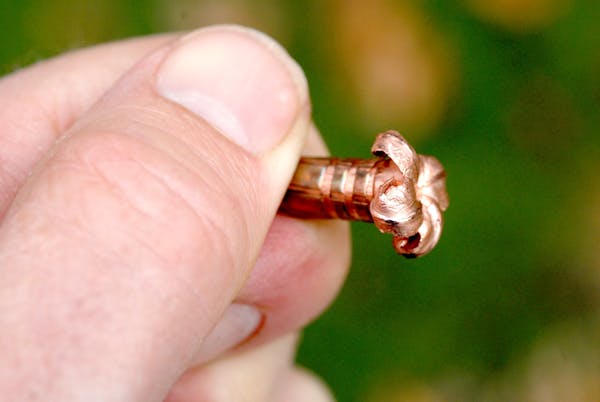Dozens of Minnesota deer hunters who illegally tried to lure their quarry with bait during last weekend's opener have had their guns confiscated, paid hundreds of dollars in fines and put their hunting privileges at risk.
This despite intensified efforts by the state Department of Natural Resources to snuff out the activity, which has been illegal since 1991 but continues to be widespread. And baiting continues even though the state's deer population remains high at more than 1 million and the deer harvest in recent years has been at or near record levels.
Baiting violates the hunters' code of fair chase and is downright unethical, officials say. It also leads deer to congregate in tight herds, which can speed the spread of disease. And baiting can affect the fortunes of other hunters because it alters deer movement.
"The guys who are hunting honestly are suffering because of the guys who are cheating," said DNR conservation officer Don Bozovsky of Hibbing.
In Hibbing alone, 11 hunters were cited and four had their guns seized. Earlier, two archers there had lost their bows. "This will be the highest number I've ever had," Bozovsky said.
He'd hoped that fines of about $385, a restitution charge of $500 for every deer taken illegally and a DNR threat to seize more violators' guns this fall might help curb the activity.
But not so.
"Some just think it's the cost of doing business," Bozovsky said.
On Saturday morning, he nabbed eight hunters, including three juveniles, at one deer camp hunting while using corn as bait. That evening, he caught a hunter with his two young sons, using grain and molasses to lure the animals. He cited the father, seizing his gun.
And on Sunday, he nailed two more hunters, and seized their guns and a deer. One faces $1,400 in fines and restitution.
Many other officers also encountered deer-baiters. Near Pierz, six hunters were cited. At Aurora, four were cited. Near Baudette, firearms were seized from three hunters.
"It was widespread," said Ken Soring, acting DNR enforcement chief. "There was maybe a little more in the north than the south, but almost every officer's report had some baiting activity."
Soring said it's too soon to know whether baiting remains as prevalent as it was last year.
Near Maple Lake, west of the Twin Cities, officer Rick Reller encountered six hunters near feeders filled with corn. They offered no excuses, and all except a juvenile were cited. Reller seized only one gun -- from the landowner who placed the bait.
"I would have had an armful [of guns] because a couple of guys had shotguns and muzzleloaders," he said.
Officers can seize guns from hunters caught baiting at their own discretion, and more appear to be doing so.
"I don't know why people risk that," Reller said. "I told them it was lucky they hadn't shot a deer; that would have been $500 more. You can buy a side of beef for that."
Reller is confident that the group won't be caught baiting again. A second big-game violation in the next three years could result in loss of their hunting privileges.
Tougher rules The DNR has tried to tighten and clarify the baiting law in recent years as baiting has become more prevalent.
Some say the law needs sharper teeth: automatic loss of hunting privileges. "Research has shown loss of hunting privileges is the most effective deterrent," Soring said.
But there's a related problem: Recreational deer feeding is popular, especially in the winter, though it has become increasingly controversial as the line between feeding and baiting has become blurred. Feeding has been banned in a portion of northwestern Minnesota, where officials are trying to eradicate bovine tuberculosis in cattle and deer.
Some conservation officers argue that the current baiting law has loopholes that need closing. One provision states that "bird feeders containing grains or nuts that are at least 6 feet above the ground are not considered bait or feed."
"That's a pretty big loophole," said Tyler Quandt, a conservation officer in Red Wing. "If a person has a bird feeder by their deer stand, it's legal for them to hunt over any corn or grain that falls out of it."
Soring doesn't buy that argument. "I don't see it as a big loophole," he said. "The food has to be 'contained.' ... If deer are able to get to that feed and someone is hunting over it, I expect them to be charged."
Another provision says the baiting restriction "does not apply to foods resulting from normal or accepted" farming activities or wildlife food plantings. The intent, Quandt said, was to exempt crop residue or crops deliberately left for wildlife. But that wording appears to exempt corn and other grains from the baiting prohibition, he said.
Soring said DNR officials don't buy the "food" definition either. "If we find out we're not able to prosecute people who are clearly using food to take deer, then we would seek a change," he said.
"The perfect fix ... is to have a feeding ban from Sept. 1 to Dec. 31," Quandt said. That idea would prohibit feeding -- and thus baiting -- during the entire deer hunting season.
Officials clearly are frustrated by the mindset of those who bait game.
Said Soring: "What are people not getting about our hunting heritage?
"It's not about taking that shortcut to fill a tag. That really cheapens it. It really is about the whole experience of scouting, looking for scrapes, finding trails, teaching your kids how to do it right and enjoying it."
French Open to reveal second retractable roof court at Roland Garros ahead of Olympics
Thibodeau shows when he's mad at his Knicks. They don't mind, knowing the coach has them set to win
LSU's Jayden Daniels downplays issues with Commanders, says he'd be 'blessed' to go No. 2 overall

Edina sophomore two-sport standout on recruiting: 'Gotten a little busy'

